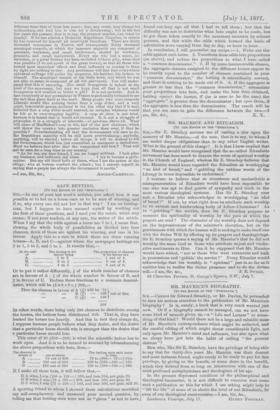MR. MAURICE AND RITUALISM.
[To THR EDITOR OF THE "SPEOTATOR.1
SIR,—Sir E. Strachey accuses me of casting a slur upon the' memory of Mr. Maurice,—of the man, that is to say, to whom I am under deeper obligations than to any other English writer. What is the ground of this charge? It is that I have implied that Mr. Maurice would have recognised that the so-called Ritualistic movement has done much to deepen the sense of spiritual worship in the Church of England, whereas Sir E. Strachey-believes that Mr. Maurice would have regarded the Ritualists as worshipping "an idol of bread," and "gabbling the sublime words of the. Liturgy in tones impossible to understand."
I venture to believe that so monstrous and uncharitable a. misrepresentation of Ritualism would have been impossible to one who was apt to find points of sympathy and truth in the most various theological systems. Has Sir E. Strachey ever. met a Ritualist who acknowledges to worshipping "an idol of bread ?" If not, by what right does he attribute such worship to an earnest and hardworking body of fellow-Christians ? As to " gabbling " the service, does Sir E. Strachey propose to. measure the spirituality of worship by the pace at which the' prayers are read ? The character of the worship does not depend on the impressiveness of the minister's elocution, but on the. genuineness with which the human will is seeking to make itself one- with the divine Will by offering up its prayers and thankagivings. Sir E. Strachey quotes a saying of Mr. Maurice's that he did not worship the same God as those who attribute unjust and vindic- ative sentiments to Him. Can it be supposed that Mr. Maurice' would have added, "nor as those *Who wear vestments and walk in processions and 'gabble' the service ?" Every Ritualist would acknowledge that his worship is " spiritual" just in so far as it enables him to realise the divine presence and to do the divine.


































 Previous page
Previous page